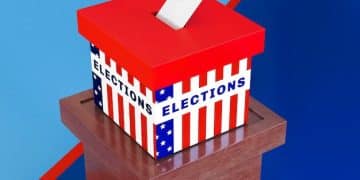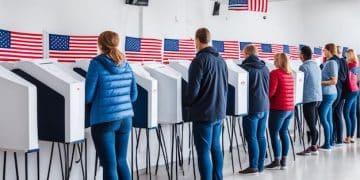PACs and Election Funding: Examining Donors & Returns

Political Action Committees (PACs) play a significant role in funding elections by pooling campaign contributions from members and donating those funds to campaigns for or against candidates, ballot initiatives, or legislation, often leading to debates about influence and transparency.
Examining the Role of Political Action Committees (PACs) in Funding Elections: Who’s Donating and What are They Getting in Return? Political Action Committees (PACs) are pivotal players in US elections, steering significant funds into political campaigns. Understanding their influence requires examining who donates to them and what they expect in return.
What Are Political Action Committees (PACs)?
Political Action Committees (PACs) are organizations established to raise and spend money to elect and defeat candidates. They represent various interests, from labor unions and corporations to ideological groups.
Types of PACs
PACs come in several forms, each with different rules and focuses. Understanding these distinctions is crucial to grasping their overall impact.
- Connected PACs: Affiliated with corporations, labor unions, or trade associations, these PACs use funds from their parent organizations.
- Non-Connected PACs: Independent groups that can raise money from individuals and other PACs, often focusing on specific issues.
- Super PACs: Officially known as independent expenditure-only committees, they can raise unlimited sums of money from corporations, unions, associations, and individuals, but cannot directly coordinate with political campaigns.
PACs are subject to regulations, including contribution limits and disclosure requirements. These rules aim to provide transparency, but the complexity often leads to loopholes and debates about their effectiveness.

In essence, PACs serve as intermediaries, channeling financial support from various sources to political candidates and campaigns, thereby influencing the political landscape.
The Role of PACs in Campaign Funding
PACs provide a significant portion of campaign funding, particularly for federal elections. Their financial contributions can influence a candidate’s ability to reach voters and shape public opinion.
Impact on Elections
The influx of money from PACs can significantly alter election outcomes. Candidates backed by well-funded PACs often have a considerable advantage.
- Increased Visibility: PAC money helps candidates fund advertising, rallies, and outreach efforts, boosting their visibility among voters.
- Message Amplification: Financial support allows candidates to control the narrative and disseminate their message more effectively.
- Competitive Edge: In close races, PAC funding can be the deciding factor, providing candidates with the resources they need to win.
While PACs contribute to campaigns, their impact on overall political discourse is a subject of ongoing debate. Some argue they enhance participation, while others claim they distort the political process.
PACs’ role in campaign funding underscores the critical need for transparency and accountability in political finance. Understanding how money flows through these committees is essential for informed civic engagement.
Who Donates to PACs and Why?
Understanding the motivations of PAC donors is key to unraveling their influence. Donations often come with expectations of political access and influence.
Motivations of Donors
Donors to PACs have various reasons for their financial support. These motivations often align with their interests and desired policy outcomes.
- Policy Influence: Many donors seek to influence policy decisions that affect their businesses or interests.
- Access to Politicians: Donating to PACs can provide donors with access to elected officials, fostering relationships and open communication.
- Ideological Alignment: Some donors support PACs that align with their ideological beliefs, contributing to causes they believe in.
The donor base of PACs is diverse, ranging from individual citizens to large corporations and unions. Each donor group has unique motivations and expectations.

By examining who donates to PACs and why, we can gain insights into the complex dynamics of political finance and its impact on policymaking.
Legal Regulations Governing PACs
PAC operations are governed by a complex framework of federal and state regulations, designed to ensure transparency and prevent corruption. However, the effectiveness of these rules is often debated.
Key Regulations
Several legal standards govern the operations of PACs in the United States, including campaign finance laws and disclosure requirements.
- Federal Election Campaign Act (FECA): Established contribution limits and disclosure requirements for PACs and campaigns.
- Bipartisan Campaign Reform Act (BCRA): Also known as McCain-Feingold, this act aimed to regulate soft money and issue ads, but faced legal challenges.
- Citizens United v. FEC: A Supreme Court decision that significantly altered campaign finance law, allowing unlimited independent expenditures by corporations and unions.
These regulations seek to balance the need for transparency and accountability with the constitutional rights of free speech and association.
Understanding the legal framework governing PACs is essential for navigating the complexities of campaign finance and promoting fair elections.
Criticisms and Controversies Surrounding PACs
PACs have faced numerous criticisms and controversies, primarily related to their influence on politicians and policies. Concerns about transparency and fairness are central to these debates.
Critics argue that PACs enable wealthy donors to exert undue influence on elected officials, potentially leading to policies that benefit special interests over the public good.
Specific Concerns Include:
PACs are often criticized for their lack of transparency, with concerns raised about the source of their funding and how they allocate their resources.
Their role in political campaigns has sparked controversies over the fairness of elections, with concerns about the impact of money on election outcomes.
The influence of PACs on politicians has raised ethical questions, with some arguing that they compromise the integrity of the political process.
| Key Point | Brief Description |
|---|---|
| 💰 PAC Definition | Organizations raising funds to support or oppose candidates. |
| 📊 Campaign Funding Role | PACs significantly impact candidate’s visibility & campaign reach. |
| 🎯 Motivations | Policy influence, access to politicians, ideological alignment. |
| ⚖️ Regulations | FECA, BCRA, and Citizens United shape PAC operations. |
Frequently Asked Questions
▼
The primary goal of a Political Action Committee (PAC) is to raise and spend money to elect or defeat political candidates. This involves pooling contributions from members and donating them to campaigns.
▼
PACs influence campaigns by providing financial support, which can significantly boost a candidate’s visibility through advertising and outreach. This funding helps candidates disseminate their message effectively.
▼
Donors to PACs include individuals, corporations, labor unions, and ideological groups. Each donor group has unique motivations, such as influencing policy or gaining access to politicians.
▼
PACs are governed by federal and state regulations, including the Federal Election Campaign Act (FECA) and court decisions like Citizens United v. FEC. These rules aim to ensure transparency and prevent corruption.
▼
Criticisms of PACs include concerns about undue influence on politicians, lack of transparency, and their impact on election fairness. Critics argue they compromise the integrity of the political process.
Conclusion
In conclusion, Political Action Committees (PACs) are critical components of US campaign finance, influencing elections and policymaking. Understanding their operations, funding, and regulations is essential for informed civic engagement and promoting transparency in politics.





